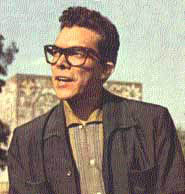![[Metroactive Music]](/gifs/music468.gif)
[ Music Index | North Bay | Metroactive Home | Archives ]
Pop! Boink! Wow!
Arranger Juan Garcia Esquivel quietly signs off
By
It was in the mid '80s that I first discovered the music of Juan Garcia Esquivel," recalls Mickey McGowan, Marin County record collector and pop culture historian. "His records were always in the easy-listening bins in used record stores--and he still is.
"But when you think about Juan Garcia Esquivel, creator of the great 1962 album Latin-Esque, and the recently rediscovered 1960 masterpiece See It in Sound, he's 180 degrees from easy," McGowan continues. "Esquivel was among the most challenging arrangers in the business."
Juan Garcia Esquivel died in Mexico on Jan. 3, just short of his Jan. 20 birthday. He would have been 84. His death was not announced until late last week, after his body had been cremated and his ashes scattered. The news wasn't unexpected: Esquivel had been ill for some time, confined to his bed the last several years. But it still came as a shock to his fans. And fans he had, though Esquivel had not released a new album of music for decades.
Known as the King of Space-Age Pop, Esquivel was, in the late '50s and '60s, one of the hottest acts going. Born in 1918 in Tampico, Tamaulipas, Mexico, he became a popular bandleader in Mexico, appearing on radio, television, and film before RCA discovered him in 1958 and lured him to America.
With a strong sense of musical whimsy--and a degree in engineering--Esquivel was fascinated with the latest achievements in stereophonic sound. In his earliest RCA efforts--Other Worlds Other Sounds, Exploring New Sounds in Stereo--Esquivel sought to push stereo music to its limits, weaving unusual sounds into his music, Ping-Ponging them from one side of the headphones to the other.
"His music was in that weird gap between the familiar and the completely strange," says McGowan, whose own musical tastes were explored in detail in the book Incredibly Strange Music (Re/Search). "You had to bridge it with your own ear."
Insisting that lyrics often prevented one from truly experiencing the music, Esquivel took songs like "Sentimental Journey" and "The Look of Love" and laced them with choruses of comic book exclamations: "Pow! Boink! Zoom!"
"Esquivel was the spicemeister of orchestrated music," says McGowan. "He was one of the great musical stylists of the 20th century."
David Harrington, violinist and musical director of San Francisco's Kronos Quartet, agrees. "Esquivel," he says, "basically invented the stereo. The technology existed, and then he came along and showed the world what to do with it."
According to Harrington, Kronos' upcoming album, titled Nuevo, owes a huge debt to Esquivel. Not only will it include a cover of Esquivel's classic 1968 hit song "Mini Skirt," the entire CD is designed as an Esquivelesque adventure through the street sounds and music of Mexico.
"I love Esquivel's sense of playfulness," Harrington concludes. "His use of sound, his recognition of the textures of sound, were one-of-a-kind."
[ North Bay | Metroactive Central | Archives ]
Copyright © Metro Publishing Inc. Maintained by Boulevards New Media.
![]()
 The King of Space-Age Pop: Esquivel took the stereo to brave new worlds.
The King of Space-Age Pop: Esquivel took the stereo to brave new worlds.
From the January 17-23, 2002 issue of the North Bay Bohemian.